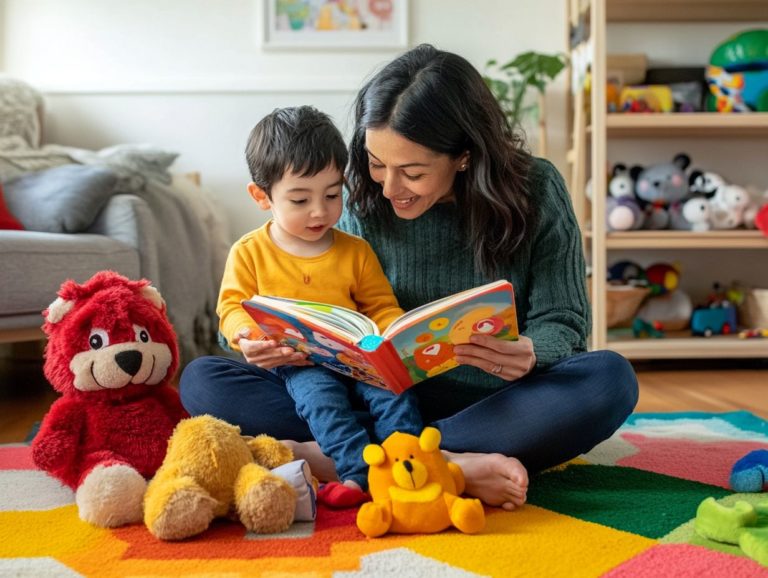How to Build Emotional Intelligence Through Talk
Emotional intelligence (EI) is an essential skill, emphasized by Daniel Goleman, that profoundly impacts your ability to navigate relationships, manage your emotions effectively, and enhance your leadership skills.
Recognizing the significance of emotional intelligence, a term popularized by Daniel Goleman, lays the groundwork for enhancing your interpersonal dynamics and personal growth.
This exploration delves into how engaging in meaningful conversations can elevate your emotional intelligence and social skills, providing insights into the types of dialogues that yield the greatest benefits.
You ll uncover practical communication tips designed to strengthen your EI, leading to improved relationships, more effective conflict resolution, heightened self-awareness, and better emotional resilience.
Dive into the transformative power of conversation and see your emotional landscape shift dramatically, promote personal motivation, and boost your psychological health!
Contents
- Key Takeaways:
- What is Emotional Intelligence?
- How Does Talking Help Build Emotional Intelligence?
- What Are the Benefits of Building Emotional Intelligence Through Talk?
- What Are Some Tips for Effective Communication to Build Emotional Intelligence?
- 4. Practicing Empathy
- Frequently Asked Questions
- What does it mean to build emotional intelligence through talk?
- Why is it important to build emotional intelligence through talk?
- How can I use talk to improve my emotional intelligence?
- What are some techniques for building emotional intelligence through talk?
- What are the benefits of building emotional intelligence through talk?
- Can I build emotional intelligence through talk on my own?
Key Takeaways:

- Effective communication is key to building emotional intelligence through talk and can lead to improved communication skills, better relationships, increased self-awareness, and effective conflict resolution, all contributing to a positive impact.
- Active listening, using “I” statements, being mindful of nonverbal cues, and practicing empathy are important tips for effective communication to build emotional intelligence and social skills.
- Building emotional intelligence through talk can have numerous benefits, including improved communication, better relationships, and increased self-awareness, making it an essential skill for personal and professional growth.
What is Emotional Intelligence?
Emotional intelligence, a concept brought to light by Daniel Goleman, is your ability to identify, understand, manage, and effectively utilize emotions in both yourself and others. This multifaceted skill includes self-awareness, emotional regulation (the ability to manage your emotions effectively), and social skills, equipping you to navigate challenges in diverse settings, particularly in the workplace.
By nurturing your emotional intelligence, you can enhance your psychological well-being and cultivate strong relationships, resulting in a more engaged and productive environment. When you grasp your emotional landscape and learn from leadership research, you can refine your communication strategies and elevate your feedback sessions, ultimately fostering an atmosphere of constructive criticism and emotional resilience.
Why is Emotional Intelligence Important?
Emotional intelligence is essential for honing your leadership skills and creating a positive work environment, as it plays a significant role in shaping interpersonal relationships and personal development. In an environment where emotional triggers can create considerable disruption, leaders with high emotional intelligence can adeptly navigate challenging situations and emotional manipulation, positively influencing team dynamics and enhancing overall workplace engagement.
When you cultivate emotional intelligence, you enable your team to enhance their performance by building emotional resilience. This resilience allows individuals to effectively manage stress and challenges, fostering healthier responses during tough times.
Embracing effective coping strategies like open communication, active listening, and empathy training inspires trust and collaboration within your team.
When your team members feel valued and understood, their morale skyrockets, paving the way for increased engagement and productivity, ultimately leading to a flourishing organizational culture.
How Does Talking Help Build Emotional Intelligence?
Engaging in conversation is vital for cultivating your emotional intelligence, as it sharpens your communication strategies and nurtures effective verbal communication and active listening skills. TED Talks often highlight the importance of these skills in personal and professional settings.
By participating in discussions, you create opportunities to express your emotional experiences, share valuable feedback, and practice emotional hygiene (which means taking care of your emotions just like you would your physical health), all of which are crucial for enhancing self-awareness and mastering your emotions.
Regular feedback sessions enable you to interpret non-verbal cues more effectively and refine your emotional responses, ultimately creating a sense of emotional agility and resilience in your life. Incorporating emotional hygiene and emotional awareness exercises can further enhance these abilities.
Types of Conversations that Enhance Emotional Intelligence
Engaging in conversations that truly enhance your emotional intelligence involves practicing empathetic communication, which means talking in a way that shows you understand and care about other people’s feelings. This means you not only express emotional empathy but also work to understand the feelings of others.
Incorporating constructive criticism is equally important, as it can encourage personal growth and development. Participating in empathy training regularly strengthens these skills.
Utilizing compassion techniques in your discussions allows you to navigate emotional experiences effectively, fostering an open dialogue. This creates a safe space for sharing feelings and emotional responses.
In these interactions, it s essential for you to actively listen to others, as this deepens connections and validates their feelings. By nurturing an environment where compassionate feedback is valued, and employing compassion techniques, you can learn to articulate your needs while also being receptive to the perspectives of those around you.
This approach not only helps to defuse potential conflicts but also strengthens relationships by building trust and mutual respect. Ultimately, the synergy of empathy and constructive feedback serves as a powerful catalyst for emotional resilience, enabling you to tackle life s challenges collectively and fortifying your interpersonal bonds.
What Are the Benefits of Building Emotional Intelligence Through Talk?

Building your emotional intelligence through conversation opens up a world of amazing benefits! You’ll see remarkable improvements in your communication skills, strengthen your relationships, increase your self-awareness, develop superior conflict resolution abilities, and foster emotional courage.
By engaging in meaningful dialogues, you cultivate emotional agility, equipping yourself to navigate challenging situations with both courage and resilience. This journey ultimately leads to more effective interpersonal relationships, greater engagement in your workplace, and more effective leadership.
1. Improved Communication Skills
Improved communication skills emerge directly from enhanced emotional intelligence. As you cultivate this intelligence, you learn to articulate your thoughts and feelings with greater clarity through effective verbal communication and active listening. This approach not only brings clarity to your conversations but also creates a space where feedback can be shared constructively, fostering emotional resilience and emotional mastery.
By refining these skills, you can forge deeper, more meaningful connections, whether in your professional life or personal relationships. Employing strategies like practicing mindfulness during discussions allows you to stay present, ensuring that your responses are thoughtful rather than impulsive.
Utilizing open-ended questions encourages richer dialogue and demonstrates a genuine interest in others’ perspectives. Active listening where you acknowledge emotions and validate feelings can truly transform your interactions, resulting in greater trust and collaboration.
Ultimately, as you approach your conversations with empathy and awareness, you lay the groundwork for healthier relationships and more productive environments.
2. Better Relationships
Building strong connections with others is essential for personal and professional happiness. Better relationships arise from your high emotional intelligence. As you cultivate emotional empathy and compassion towards others, you deepen your interpersonal connections and build trust. This emotional understanding equips you for more meaningful interactions and enables you to resolve conflicts constructively.
For instance, in personal relationships, when you actively listen and validate your partner’s feelings, you foster an environment where both of you feel valued and understood. In the workplace, a manager who empathizes with their team s challenges often inspires loyalty and collaboration, ultimately leading to increased productivity.
Such dynamics not only reduce misunderstandings but also cultivate a culture of support and encouragement. This allows individuals to feel safe in expressing their thoughts and feelings. Ultimately, by enhancing your emotional intelligence, you can create a ripple effect that elevates not only your individual relationships but also enriches the broader community around you.
3. Increased Self-Awareness
Increased self-awareness is a key advantage of developing emotional intelligence. It allows you to pinpoint your emotional responses and grasp the triggers behind them. This self-awareness helps you manage your emotions better, paving the way for profound personal growth and self-improvement.
By recognizing patterns in your emotional reactions, you gain the ability to consciously choose your responses rather than reacting on impulse. This journey of self-discovery can be further enriched through practices like journaling, mindfulness meditation, and regular reflection. Engaging in these activities not only deepens your insight into your emotional landscape but also enhances your empathy towards others and your ability to make accurate emotional predictions.
As you cultivate self-awareness, you unlock the potential for improved communication and stronger relationships. This ultimately fuels your emotional and personal evolution.
4. Better Conflict Resolution
You can achieve better conflict resolution through emotional intelligence. This skill enables you to navigate emotional responses and apply constructive criticism effectively. Mastering this skill transforms you into an effective leader, ready to tackle any challenge! This invaluable skill allows you and your colleagues to address disagreements in ways that foster understanding rather than escalate tension. Developing strong leadership skills and self-awareness can help manage the emotional landscape of your team.
Consider a situation during a team project when differing opinions lead to friction. A team member who is aware of their emotional triggers can manage their reactions, creating an environment conducive to open dialogue. By delivering criticisms constructively, they steer conversations away from defensiveness and toward collaborative problem-solving. Picture this: one colleague feels overlooked during a meeting. An emotionally intelligent team member would recognize this discomfort and address it directly, validating feelings while promoting a solution-oriented discussion.
This approach not only resolves the immediate conflict but also enhances team cohesion, builds trust among members, and improves overall workplace engagement.
What Are Some Tips for Effective Communication to Build Emotional Intelligence?

Renowned psychologist Daniel Goleman highlights the importance of emotional intelligence in effective communication. Here are some strategies you can employ to elevate your interactions:
- Embrace active listening
- Utilize ‘I’ statements
- Participate in feedback sessions
- Be attuned to non-verbal cues
Practicing these techniques will enable you to build strong relationships, nurture emotional resilience, and improve your overall emotional awareness in communication.
1. Active Listening
Active listening is an essential skill in emotional intelligence. It requires you to fully engage with the speaker and understand their emotional responses without casting judgment. This approach fosters a deeper connection and elevates the quality of your communication.
Effective listening skills are foundational to mastering this. By attentively observing both verbal and non-verbal cues, you create an environment in which speakers feel valued and truly heard.
Techniques like paraphrasing, maintaining eye contact, and posing open-ended questions clarify the message being conveyed. They also reflect your genuine interest in the conversation. These skills are crucial for effective verbal communication.
The importance of active listening goes beyond the surface of mere dialogue; it serves as the bedrock for building trust and respect in your relationships. Enhancing your interpersonal connections through active listening paves the way for clearer communication, reducing misunderstandings and conflicts.
This is essential for maintaining good psychological health in all interactions. As you cultivate this ability, you may discover that your relationships become richer and more fulfilling. This practice can have a positive impact on your psychological wellbeing.
2. Using ‘I’ Statements
‘I’ statements serve as a powerful communication tool. They enable you to express your feelings and thoughts without casting blame, thereby fostering self-awareness and emotional intelligence.
This approach promotes understanding and helps to reduce defensiveness in conversations. It can be particularly useful in relationship building.
By framing your feelings and needs from a personal perspective, you create a safe space for dialogue. This makes it easier for others to connect with your emotions.
The structure of an ‘I’ statement typically follows this format: I feel [emotion] when [situation] because [reason]. For instance, instead of saying, You never listen to me, you might express it as, I feel unheard when I try to share my thoughts because it seems like you’re distracted.
This technique also boosts empathy and helps you manage your emotions more effectively. This subtle shift clarifies your feelings and invites a more constructive response, paving the way for deeper understanding and emotional empathy.
3. Being Mindful of Nonverbal Cues
Being mindful of nonverbal cues is crucial to your emotional intelligence. Body language, facial expressions, and the tone of your voice profoundly impact communication and emotional responses.
By understanding these signals, you can engage more meaningfully with others. These techniques are vital for effective communication and navigating challenging situations.
Interpreting nonverbal communication involves paying attention to subtle shifts in posture, eye contact, and gestures. These often reveal more than words ever could.
For example, a slight downturn of someone’s mouth might indicate sadness, while crossed arms may suggest defensiveness or discomfort. When you learn to recognize these indicators, you can adjust your responses to align more closely with the actual emotions being expressed.
This practice aids in building emotional awareness and can improve psychological wellbeing. This heightened awareness fosters deeper connections and enhances empathetic exchanges between individuals.
It allows for more effective communication in both personal and professional realms. These techniques can also improve leadership skills and relationship building.
4. Practicing Empathy
Practicing empathy is a cornerstone of emotional intelligence, allowing you to connect deeply with the feelings and experiences of others. This practice not only enhances your emotional empathy but also strengthens your ability to build relationships by fostering trust and understanding. Techniques from experts like Gill Hasson can be beneficial in this area.
By actively listening and validating the feelings of those around you, you can cultivate a supportive environment where open communication thrives. Simple gestures, like maintaining eye contact during conversations or reflecting on what others share, can significantly enhance your interactions. When you express understanding through thoughtful responses, you show that you value others’ perspectives, which promotes a deeper bond.
Empathy training is a valuable practice that helps you understand and share the feelings of others.
Over time, this practice of empathy can lead to more meaningful connections, creating a sense of community in both your personal and professional relationships. Ultimately, this enhances collaboration and reduces conflicts, making your interactions richer and more fulfilling. This practice is crucial for your personal growth and can dramatically improve your relationships with others!
Frequently Asked Questions

What does it mean to build emotional intelligence through talk?
Building emotional intelligence through talk means using communication and conversation to develop skills and awareness related to emotions, such as self-awareness, empathy, and self-regulation. Engaging in emotional awareness exercises can also be highly beneficial.
Why is it important to build emotional intelligence through talk?
Building emotional intelligence through talk can improve relationships, increase self-awareness, and help manage emotions in a healthy and productive way. Insights from leadership research indicate that these skills are essential for motivating teams and achieving personal growth.
How can I use talk to improve my emotional intelligence?
You can use talk to improve your emotional intelligence by actively listening to others, reflecting on your own emotions and reactions, and practicing effective communication skills. Incorporating communication strategies and mindfulness practices can further enhance this development.
What are some techniques for building emotional intelligence through talk?
Some techniques for building emotional intelligence through talk include using assertive communication, practicing active listening, and expressing empathy towards others. Focusing on emotional hygiene and psychological health are also important techniques.
What are the benefits of building emotional intelligence through talk?
The benefits of building emotional intelligence through talk include improved relationships, better self-awareness, increased empathy and understanding of others, and better stress management. Engaging in compassion techniques and TED Talks on emotional intelligence can provide further insights and benefits.
Can I build emotional intelligence through talk on my own?
While it is possible to improve emotional intelligence through self-reflection and self-directed learning, seeking support from a therapist or joining a coaching group can also be helpful in building emotional intelligence through talk. Watching TED Talks on emotional intelligence and practicing emotional courage in your interactions can also be beneficial.
Start practicing empathy today and watch your relationships flourish!






